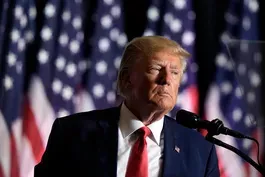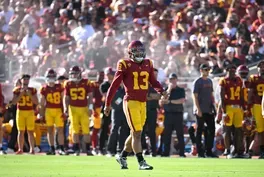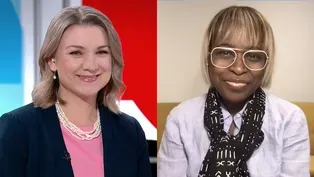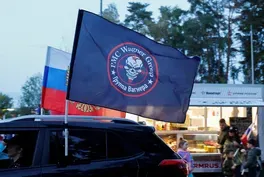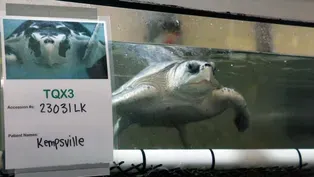
Where race issues stand 60 years after March on Washington
Clip: 8/28/2023 | 9m 54sVideo has Closed Captions
Where issues of race and activism stand 60 years after March on Washington
The March on Washington for Jobs and Freedom in 1963 was one of the most consequential racial justice and equality demonstrations in U.S. history and helped till the ground for passage of federal civil rights legislation. This weekend, thousands gathered for the 60th anniversary to remind the nation of its unfinished goals. Geoff Bennett discussed more with Lonnie Bunch and Janai Nelson.
Major corporate funding for the PBS News Hour is provided by BDO, BNSF, Consumer Cellular, American Cruise Lines, and Raymond James. Funding for the PBS NewsHour Weekend is provided by...

Where race issues stand 60 years after March on Washington
Clip: 8/28/2023 | 9m 54sVideo has Closed Captions
The March on Washington for Jobs and Freedom in 1963 was one of the most consequential racial justice and equality demonstrations in U.S. history and helped till the ground for passage of federal civil rights legislation. This weekend, thousands gathered for the 60th anniversary to remind the nation of its unfinished goals. Geoff Bennett discussed more with Lonnie Bunch and Janai Nelson.
How to Watch PBS News Hour
PBS News Hour is available to stream on pbs.org and the free PBS App, available on iPhone, Apple TV, Android TV, Android smartphones, Amazon Fire TV, Amazon Fire Tablet, Roku, Samsung Smart TV, and Vizio.
Providing Support for PBS.org
Learn Moreabout PBS online sponsorshipGEOFF BENNETT: It was one of the most consequential racial justice and equality demonstrations in U.S. history, the March on Washington for Jobs and Freedom.
On August 28 1963, a quarter-of-a-million people rallied in Washington, D.C., to demand an end to segregation, fair wages and economic justice, voting rights, education, and long overdue civil rights protections.
From the steps of the Lincoln Memorial, the late Reverend Dr. Martin Luther King Jr. delivered his most famous speech.
MARTIN LUTHER KING JR., Civil Rights Leader: Free at last.
Free at last.
Thank God almighty we are free at last!
(CHEERING AND APPLAUSE) GEOFF BENNETT: The demonstration helped pave the way for the passage of federal civil rights and voting rights legislation.
On Saturday,thousands of people gathered on the National Mall to commemorate the 60th anniversary and remind the nation of its unfinished goals of that day.
For insight, I spoke Friday with two leading voices about the march and the present-day pursuit of civil rights.
We are joined now by Lonnie Bunch, the secretary of the Smithsonian Institution.
He was also the founding director of the National Museum of African American History and Culture.
And with us here in the studio is Janai Nelson, president and director counsel of the NAACP Legal Defense Fund.
Thank you both for being here.
Really appreciate it.
And I'd like to start, if we could, by talking about the history of the march, which I think is always important and instructive.
Mr.
Bunch, was Bayard Rustin, as you well know, who organized the March on Washington.
And, at the time, there had been any number of marches across the South.
But the idea that hundreds of thousands of people would answer the call and come to Washington, D.C., that was unheard of.
How was he able to pull together what was the largest demonstration the country had ever seen in a matter of months?
LONNIE BUNCH, Smithsonian Institution Secretary: Well, I think it's important to realize that they really worked on this for several years.
But with A. Philip Randolph's leadership and Bayard Rustin, what they realized is, this was an opportunity to sort of bring together people from the civil rights organizations, as well as from United Auto Workers organization.
And what they did is, they were able to sort of just figure out, how do you mobilize everything from sororities and fraternities to make sure that you have got, in essence, a large group of people, so that you have got to turn out of over -- almost 300,000 people?
GEOFF BENNETT: What does effective organizing look like today?
JANAI NELSON, NAACP Legal Defense and Educational Fund: Effective organizing is something that has roots in the history of the civil rights movement and labor movements and other protest movements, but today is something that has been much more systematized in many ways.
It has the benefit of the use of technology.
And more young people are aware of the power of organizing and are organizing themselves in important ways to protest, to engage in action.
And we saw that spontaneously occur in 2020, in response to the tragic killing of George Floyd and Breonna Taylor and others.
And, today, the role of organizing is a very respected one.
It always has been recognized, but it's been elevated because I think people understand how important it is to have people ready to be mobilized to not just ask for change, but to ensure accountability when change happens.
LONNIE BUNCH: I think it's is important to realize that technology has allowed especially a younger generation not just to be part of a protest, but to help lead it.
And I think that's a really important point of this is that, you look at the murder of George Floyd, and you see young people around the world utilizing technology to make sure that they're not just involved, but they're leading.
And I think that's an optimistic thing as we look to the future.
GEOFF BENNETT: And Bayard Rustin believed that the fates of the civil rights movement and the labor movement were intertwined, that the visions of racial justice and economic justice were linked.
Do you see it that way?
And how does that manifest today?
JANAI NELSON: Absolutely.
You can't think about the history of race in this country and not think about economics.
We think about the idea that Black people were brought here from the continent of Africa to power a system of enslavement, of labor, free labor, of work camps, forced labor camps, that helped to grow, the economy of this country, helped to seed wealth into some communities and leave others completely destitute.
That is the history of this country.
And that was directly based on racial lines, whether you were Black or you were white.
And so, as we think about how the civil rights movement evolved, it carried forth that legacy, the vestiges of slavery, and, of course, Jim Crow, and, of course, current-day racism that continues to create an economic divide based on color lines.
GEOFF BENNETT: In the past few years, we have seen demonstrations against police brutality after the police killing of George Floyd and others.
We have seen acts of civil disobedience in support of gun reform.
Mr.
Bunch, you have said that protest is the highest form of patriotism.
Tell me more about that.
In what way?
LONNIE BUNCH: I would argue that, if you love a country, what you want to do is help that country live up to its stated ideals.
And America is an aspirational nation.
If you look at its founding documents, we are working hard to live up to those.
And so, for me, if you protest, you are not saying the nation is horrible.
What you're saying is, I can help it live up to its stated ideals.
So for me, if you protest the country, what you are simply saying is, you love it, and you want it to be the best it can be.
GEOFF BENNETT: Janai Nelson, the issues that are animating social justice advocates today, many of them seem eerily similar to the issues that were present in 1963, in different ways, of course.
But you have got the erosion of voting rights across the country.
You have got questions about access to education after the Supreme Court struck down the use of affirmative action in college admissions decisions.
There are growing threats of political violence and hatred against people of color, against Jews, against members of the LGBTQ community.
Do you see it that way?
JANAI NELSON: Yes.
Not only are these issues eerily similar.
They are the same ones that we have been dealing with for decades.
The difference is that we were evolving towards solutions.
We were expanding constitutional rights and protections in order to solve those issues, gradually, perhaps a little too gradually for my taste, but we were on a path towards greater inclusion and greater equity.
What we're seeing in this moment is a backlash and a retrenchment to that movement.
And what this march allows us to think about is the power of mass demonstration, of mass action, to galvanize the forces of people to ensure that the right legislation is passed, that elected officials recognize the will and wishes of the majority and are responsive to the despair of people across the country.
That's what this march should remind us to do.
And back to the issue of protests, the founder of the Legal Defense Fund, Thurgood Marshall, said that protest is the foundation of American democracy.
So this has always been how we have evolved our country to become a more perfect union.
GEOFF BENNETT: What about that, Mr.
Bunch?
Is mass demonstration still an effective technique?
LONNIE BUNCH: Absolutely.
You don't have a country change unless you have got enough people to see it in the media, to have the influence on the federal government to change the laws.
So, for me, protests, sophisticated, strategic protest, is really an effective tool.
It is one of the ways that you make sure that you're heard, that you're seen, and that it forces you to think about, what are the strategic goals that you want out of this protest?
So, that is, in my mind, one of the most effective tools we have to change a nation.
GEOFF BENNETT: Five years after the March on Washington, Dr. King gave a famous speech at the National Cathedral in Washington, D.C., where he famously said, "We shall overcome because the arc of the moral universe is long, but it bends toward justice."
When you survey the arc of the last 60 years, what do you see?
LONNIE BUNCH: Well, I think what you see is that we have made amazing progress, but that, in essence, the realization is that you are not going to be -- you're not going to continue to get to where you want to be unless you continue to fight and struggle for it, that, in essence, what's really clear to me is that we have a retrenchment.
We have people that are pushing back against things that we thought were given, and that, in essence, that, while the arc may bend, we have got to help it bend in the right direction.
JANAI NELSON: I see that we are in a moment of great peril and crisis, but also one of great opportunity.
And the moral arc does bend, but there are also opposing forces that are trying to pull it in the opposite direction.
This is a moment for us to recognize the power of people, of protest, of advocacy, of law, which is what we do at the Legal Defense Fund.
We use the power of law to transform society, but it needs all of those forces together to ensure that this change occurs, and that it is durable, that it lasts, because this moment teaches us, if we don't continue to pay attention to the direction of this country, we can be pulled backwards in a way that is extraordinarily dangerous and poses an existential -- existential threat to our democracy.
GEOFF BENNETT: Janai Nelson and Lonnie Bunch, my deep thanks to you both.
JANAI NELSON: Thank you.
Judge sets trial date for Trump's election interference case
Video has Closed Captions
Federal judge sets March trial date for Trump's federal election interference case (4m 38s)
Shakeups looming for college football powerhouse conferences
Video has Closed Captions
A look at the major shakeups looming for college football's powerhouse conferences (5m 50s)
Tamara Keith and Errin Haines on Trump's trial date
Video has Closed Captions
Tamara Keith and Errin Haines on Trump's trial date and who's seeing a post-debate bounce (9m 54s)
What's next for Russia in Africa after Prigozhin death
Video has Closed Captions
What's next for Russia and Wagner Group in Africa following death of Prigozhin (9m 43s)
Why some lawmakers want to reform the Endangered Species Act
Video has Closed Captions
Why some lawmakers want to reform the Endangered Species Act (7m 16s)
Providing Support for PBS.org
Learn Moreabout PBS online sponsorshipMajor corporate funding for the PBS News Hour is provided by BDO, BNSF, Consumer Cellular, American Cruise Lines, and Raymond James. Funding for the PBS NewsHour Weekend is provided by...

